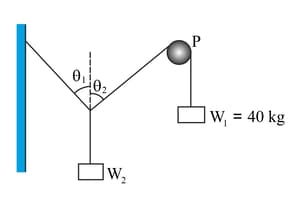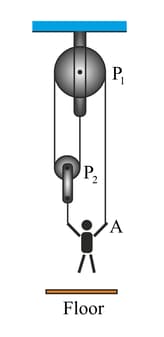Chittaranjan Dasgupta and Asok Kumar Das Solutions for Chapter: Equilibrium of Concurrent Forces and Friction, Exercise 1: EXERCISE
Chittaranjan Dasgupta Physics Solutions for Exercise - Chittaranjan Dasgupta and Asok Kumar Das Solutions for Chapter: Equilibrium of Concurrent Forces and Friction, Exercise 1: EXERCISE
Attempt the practice questions on Chapter 7: Equilibrium of Concurrent Forces and Friction, Exercise 1: EXERCISE with hints and solutions to strengthen your understanding. A Text Book of PHYSICS PART I : CLASS 11 solutions are prepared by Experienced Embibe Experts.
Questions from Chittaranjan Dasgupta and Asok Kumar Das Solutions for Chapter: Equilibrium of Concurrent Forces and Friction, Exercise 1: EXERCISE with Hints & Solutions
A piece of wood of mass rests on an inclined plane. The co-efficient of friction between the surfaces in contact is . To what maximum extent the plane may be inclined without allowing the piece to slip down?
Two identical loads are suspended each from the middle of a string. The strings sag due to the loads and make angles and with the horizontal , which of the string is subjected to greater tension ? Explain.
A body of mass is hung by two strings. One of the strings is inclined at an angle of with the vertical line. What will be the angle of inclination of the other string with the vertical line so that the tension in that string will be minimum? What are the tensions of the strings ?
In the arrangement shown in the figure shown below, and . What should be the value of for the system to be in equilibrium ? Assume the pulley to be frictionless.


In the figure shown above, we see a long string and two pulleys and which are smooth and have negligible weight. A boy of weight 300 N pulls the end A of the string downward and supports himself free from the floor. Find the force with which he must pull.
A box of mass rests upon an inclined plane. The inclination of the plane to the horizontal direction is gradually increased. It is found that when the slope of the plane is in , the box starts sliding down the plane. Find the co-efficient of friction between the box and the plane. What force applied to the box parallel to the plane will make it move up the plane ? .
A block slides with uniform speed down an inclined plane which is inclined at an angle of to the horizontal. If the same block is projected up the plane with an initial velocity of , how far up the plane would it travel before it comes to rest? Will the block slide down the plane again ?
How high can a particle rest inside a hollow sphere of radius , if the co-efficient Of friction be ?
